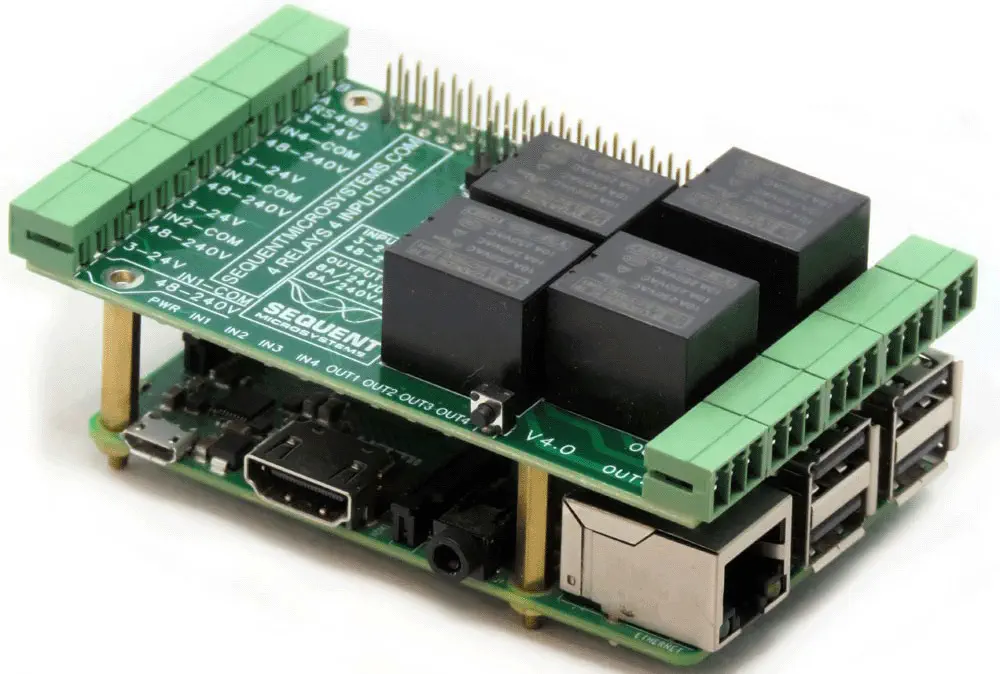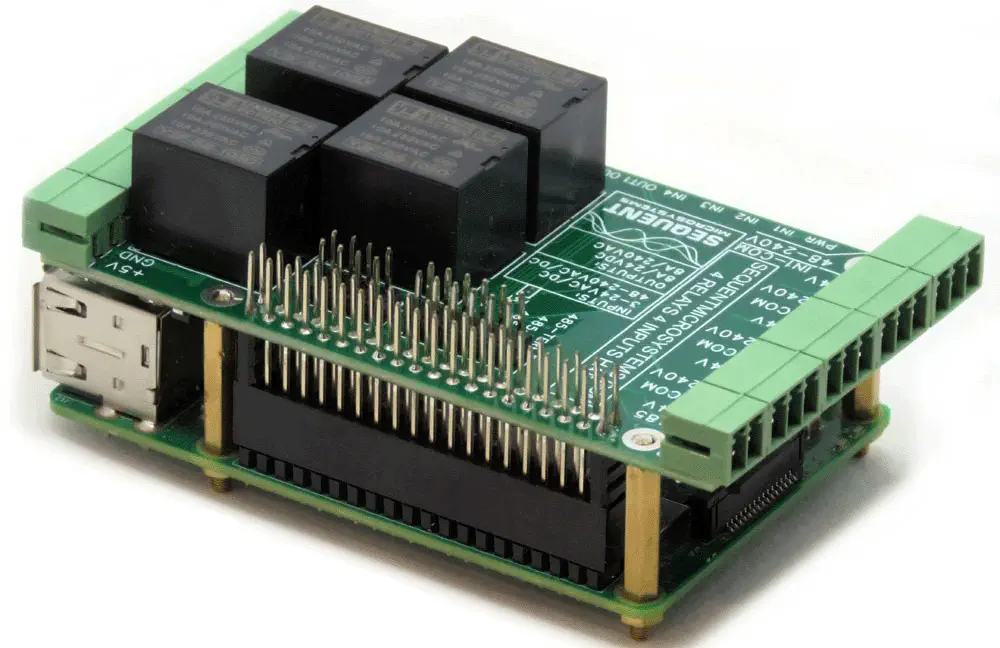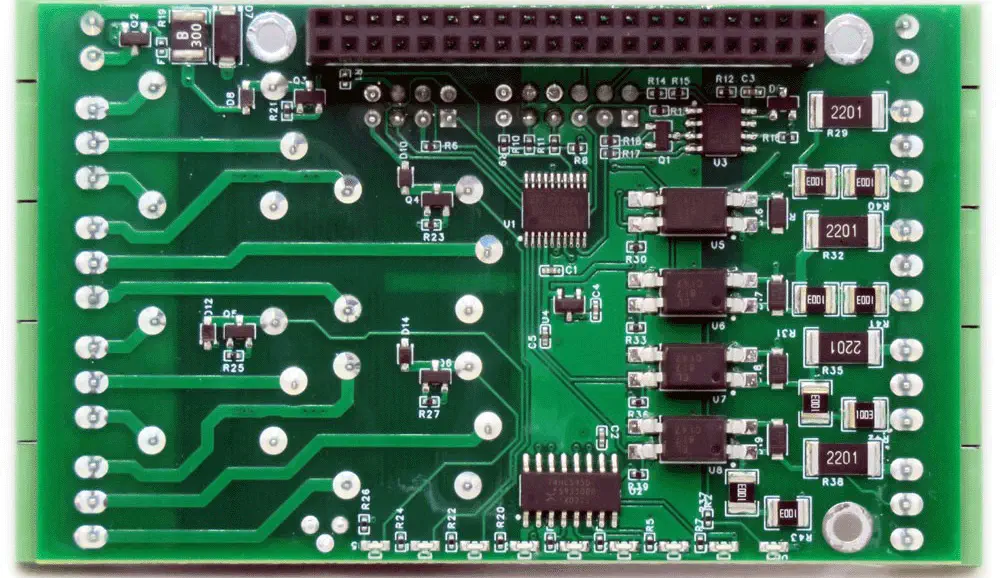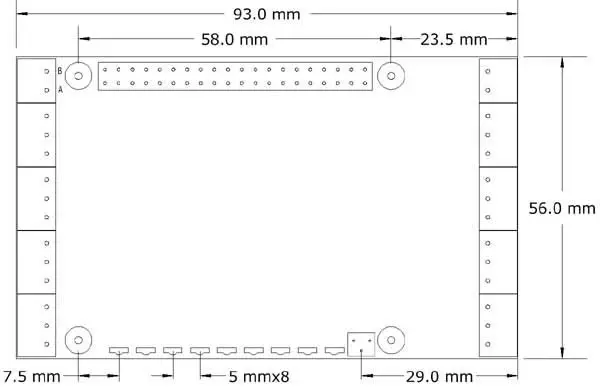- Sequent Microsystems 4 Relays 4 HV Inputs 8-Layer Stackable HAT for Raspberry Pi
- Versatile for both home and industrial automation projects
- Stackable up to eight layers for the compact form factor
- Compatible with all Raspberry Pi versions from Zero to 4
- Features pluggable connectors for ease of use
- Equipped with a momentary on-push button for convenient shutdown
The Sequent Microsystems 4 Relays 4 HV Inputs 8-Layer Stackable HAT for Raspberry Pi is a versatile device designed for both home and industrial automation projects. It is equipped with four heavy-duty relays and four high voltage inputs, capable of driving 8A/240VAC loads and reading 3V to 240V, AC or DC, optoisolated inputs.
This device is an ideal addition to any project that requires control of a large number of heavy-duty AC loads or needs to read a wide range of inputs. It is designed to be stackable up to eight layers, allowing the addition of up to 32 relays to each Raspberry Pi in a compact form factor. Furthermore, it can read up to 32 opto-isolated inputs.

The 4-RELAYS card features pluggable connectors for ease of use when multiple cards are stacked. All relays have Normal Open and Normal Close contacts and can switch up to 8A/240VAC. The optically isolated universal inputs can read AC or DC signals from 3V to 48V. The input connectors have a low voltage port for signals between 3V and 24V, and a high voltage port for signals between 24V and 48V.
The card is compatible with all Raspberry Pi versions from Zero to 4. All stacked cards share the I2C bus, using only two of the Raspberry Pi’s GPIO pins to manage all eight cards, leaving the remaining 24 GPIOs available for the user. The card operates on 5V power, which can be supplied from the Raspberry Pi or from its own 2-pin pluggable connector.

The relay coils are also powered by the 5V. The card draws 10 mA with all relays off, and each relay requires about 80 mA to turn on. If power is applied to the 2-pin pluggable connector, no other power supply is needed for the Raspberry Pi.
Each card is identified by jumpers installed to indicate the level in the stack, and cards can be installed in any order. A three-position jumper selects the stack level. The board is protected from accidental reverse power supply with a 5.8A, 39 mOhm MOSFET which breaks the ground line if reverse power is applied.
A momentary push-button installed at the edge of the board provides a convenient way to shut down the Raspberry Pi. The button is read by the local processor, which can be programmed to signal the Raspberry Pi by setting low pin 37 of the Raspberry Pi GPIO connector (GPIO26). The status of the push button can also be read from the I2C interface.

The card can be tested before installation by running a simple command from the command line. The card will cycle each relay on and off at 0.5 seconds intervals. A standard RS485 transceiver permits the Raspberry Pi to communicate using any protocol including MODBUS, PROFIBUS, camera PTZ control, etc. The transceiver can be driven either from the Raspberry Pi serial port or directly from the local processor.
The card can read transition counters to 4kHz on all inputs, input counters with cumulative or PPS (pulse per second) reading up to 4kHz, 2 x Quadrature encoder inputs reading up to 4000 PPS, and PWM inputs on each channel, reading both the fill factor and the frequency. The card can be installed parallel on a DIN-Rail using the DIN-Rail Kit Type 1, or perpendicular using the DIN-Rail Kit Type 2.
Please note: The card is protected from accidental reverse power supply with a 5.8A, 39 mOhm MOSFET which breaks the ground line if reverse power is applied. A momentary push-button installed at the edge of the board provides a convenient way to shut down the Raspberry Pi. The button is read by the local processor, which can be programmed to signal the Raspberry Pi by setting low pin 37 of the Raspberry Pi GPIO connector (GPIO26). The status of the pushbutton can also be read from the I2C interface.





















